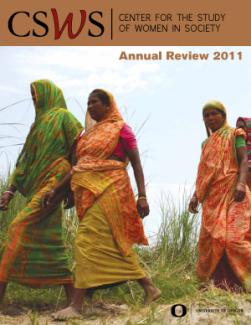File
Faculty Research:
- "Capitalism, Politics, and Gender: A Suicide in Shanghai," by Bryna Goodman
- "Studying Bollywood: An Interview with Sangita Gopal," by Alice Evans
- "Heavenly Desires: Tablighi Jama’at and the Regulation of Women in Bangladesh," by Lamia Karim
- "Pakistan: Gathering Stories of Women in the Valley of Swat," by Anita Weiss
- "Female Stars Are Born: Gender, Lighting Technology, and Japanese Cinema," by Daisuke Miyao
- "Paean to CSWS: for Giving Me a Career and a Book," by Louise Bishop
- New Women Faculty Introductions
Graduate Student Research:
- "Fighting for Forests: Gendered Conflicts in Mozambique’s Forest Landscapes," by Ingrid L. Nelson
- "Complex Lives: Interviews with Transmen in the Southeastern United States," by Miriam Abelson
- "Pathways and Fences: Gender, Violence, and Mobility in El Paso, Texas and Ciudad Juárez, Chihuahua," by René Kladzyk
- "Bolivian Entrepreneurs, Water Rights, and Roller Derby: Graduate Road Scholars Share Their Research," by Alejandra Garcia, Rebecca Toews, and Megan Burke
Highlights from the Academic Year:
- "Feminism and Ecology: The Gendered Politics of Food According to Vandana Shiva," by Margaret Hallock
- Undergraduate Research: Jane Higdon Winners
- Looking at Books
Publication Year
2011
Articles
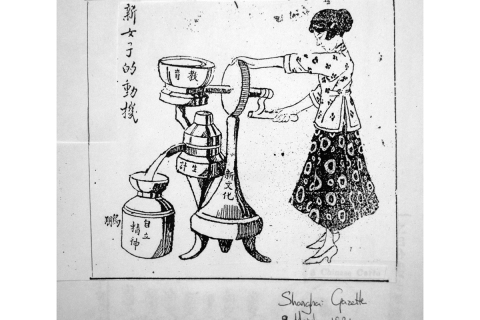
Capitalism, Politics, and Gender: A Suicide in Shanghai
by Bryna Goodman, Professor of History and Director of Asian Studies
On September 8, 1922, a mysterious and inexplicable suicide took place in Shanghai’s International Settlement, the Anglo-American-dominated foreign enclave that constituted one territorial authority in a city of multiple and fragmented jurisdictions. A young female secretary who worked at the liberal, politically outspoken Shanghai Chinese newspaper, the Journal of Commerce, was found hanged on the premises. Discovering her missing at an office dinner, a coworker summoned her family members and pushed open the office door, finding her dangling from the cord of an electric teakettle that had been looped around a window frame.
On September 8, 1922, a mysterious and inexplicable suicide took place in Shanghai’s International Settlement, the Anglo-American-dominated foreign enclave that constituted one territorial authority in a city of multiple and fragmented jurisdictions. A young female secretary who worked at the liberal, politically outspoken Shanghai Chinese newspaper, the Journal of Commerce, was found hanged on the premises. Discovering her missing at an office dinner, a coworker summoned her family members and pushed open the office door, finding her dangling from the cord of an electric teakettle that had been looped around a window frame.
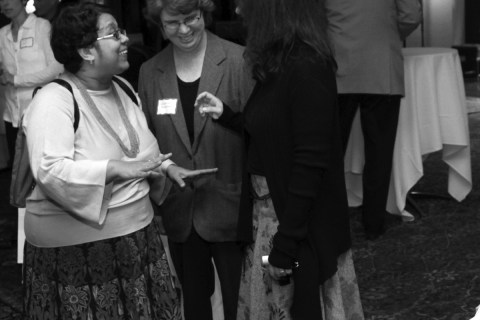
Studying Bollywood: An Interview with Sangita Gopal
Sangita Gopal, recently tenured associate professor of English, grew up in Calcutta and moved to the United States to attend graduate school at the University of Rochester in upstate New York, where she studied literary theory and film studies. She joined the University of Oregon faculty in 2004. Her book Conjugations: Marriage and Form in New Bollywood Cinema, is due out in fall 2011 from the University of Chicago Press. She coedited the book Global Bollywood: Travels of Hindi Song and Dance (Gopal & Moorti, University of Minnesota Press, 2008).
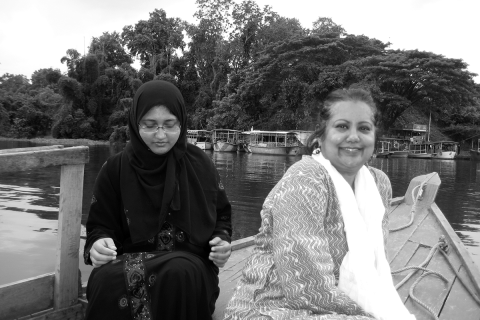
Heavenly Desires: Tablighi Jama’at and the Regulation of Women in Bangladesh
by Lamia Karim, Associate Professor, Department of Anthropology, and Associate Director, Center for the Study of Women in Society
In 2009, I went to Bangladesh with a National Science Foundation research grant to conduct four months of ethnographic research among a group of women who belonged to a pietist movement known as Tablighi Jama’at. The Tablighi Jama’at is a global missionary movement that was started by Muhammad Ilyas in 1926 in India. It is a spiritual movement that seeks to bring Muslim conduct in line with the life and teachings of Prophet Muhammad.
In 2009, I went to Bangladesh with a National Science Foundation research grant to conduct four months of ethnographic research among a group of women who belonged to a pietist movement known as Tablighi Jama’at. The Tablighi Jama’at is a global missionary movement that was started by Muhammad Ilyas in 1926 in India. It is a spiritual movement that seeks to bring Muslim conduct in line with the life and teachings of Prophet Muhammad.
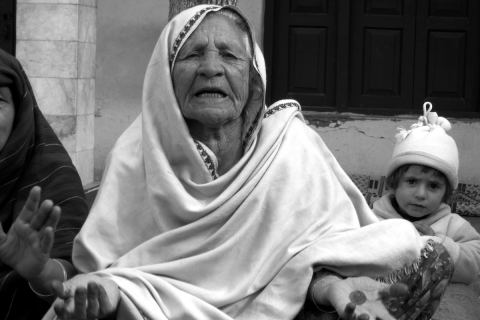
Pakistan: Gathering Stories of Women in the Valley of Swat
by Anita Weiss, Professor and Head, Department of International Studies
The majestic Valley of Swat has endured many challenges and transformations in its storied history, but none may have the lasting impact on space and society as the occupation of the area by the Pakistan Taliban in the mid-2000s and the subsequent invasion by the Pakistan military to root them out in May 2009. The winding road to Swat, up through the Malakand Pass in the Provincially Administered Tribal Area (PATA) of the Khyber Pakhtunkhwa province, makes for a formidable barrier from the rest of Pakistan.
The majestic Valley of Swat has endured many challenges and transformations in its storied history, but none may have the lasting impact on space and society as the occupation of the area by the Pakistan Taliban in the mid-2000s and the subsequent invasion by the Pakistan military to root them out in May 2009. The winding road to Swat, up through the Malakand Pass in the Provincially Administered Tribal Area (PATA) of the Khyber Pakhtunkhwa province, makes for a formidable barrier from the rest of Pakistan.

Female Stars Are Born: Gender, Lighting Technology, and Japanese Cinema
by Daisuke Miyao, Associate Professor, East Asian Languages and Literatures
“It is no comparison. My mother had a much better acting skill than my father. My father’s acting was like, ‘I will show you how I can perform,’ but mother’s was so natural that we were able to watch it in a relaxed manner. My father knew about it very well.”1 The late Hayakawa Yukio, son of silent film superstar Sessue Hayakawa—the first and arguably the only Asian matinee idol in Hollywood—thus talked about his famous father and lesser-known stepmother, Aoki Tsuruko (1891-1961).
“It is no comparison. My mother had a much better acting skill than my father. My father’s acting was like, ‘I will show you how I can perform,’ but mother’s was so natural that we were able to watch it in a relaxed manner. My father knew about it very well.”1 The late Hayakawa Yukio, son of silent film superstar Sessue Hayakawa—the first and arguably the only Asian matinee idol in Hollywood—thus talked about his famous father and lesser-known stepmother, Aoki Tsuruko (1891-1961).
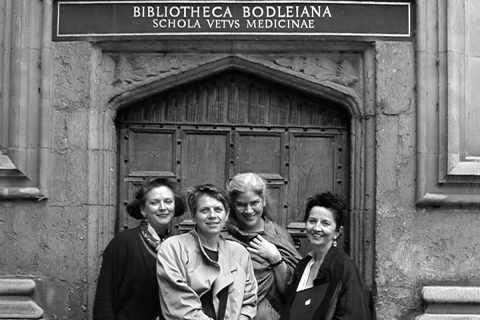
Paean to CSWS: for Giving Me a Career and a Book
by Louise M. Bishop, Associate Professor of Literature, Robert D. Clark Honors College
I’m of a generation—maybe there are others of you, and maybe it’s not as generational as I might think—where we “made do” with whatever sorts of academic career we could cobble together. Sometimes it could mean trailing a spouse, sometimes it could mean working in a non-tenure-track position, sometimes both; always it seemed to mean that there was no local automatically—and immediately—available berth to support the intellectual growth and research that a PhD seemed to promise.
I’m of a generation—maybe there are others of you, and maybe it’s not as generational as I might think—where we “made do” with whatever sorts of academic career we could cobble together. Sometimes it could mean trailing a spouse, sometimes it could mean working in a non-tenure-track position, sometimes both; always it seemed to mean that there was no local automatically—and immediately—available berth to support the intellectual growth and research that a PhD seemed to promise.
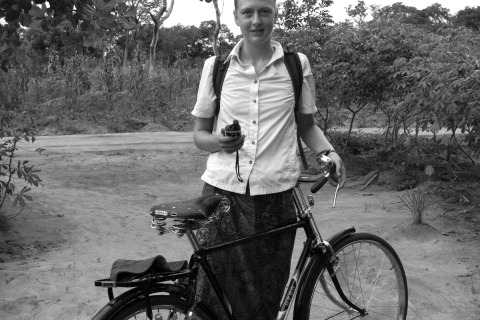
Fighting for Forests: Gendered Conflicts in Mozambique’s Forest Landscapes
by Ingrid L. Nelson, Department of Geography
Slow-growing miombo woodlands, which have supported rural Mozambicans with fuel, food, and fodder for centuries, are being decimated by two recently emerging global forces: China’s illegal timber extraction, and the indirect impacts of large-scale land acquisition by transnational corporations, especially for biofuel and fast-growing monoculture eucalyptus plantations. This is altering the sustainability of and ownership rights over thousands of hectares of forest and farmland.
Slow-growing miombo woodlands, which have supported rural Mozambicans with fuel, food, and fodder for centuries, are being decimated by two recently emerging global forces: China’s illegal timber extraction, and the indirect impacts of large-scale land acquisition by transnational corporations, especially for biofuel and fast-growing monoculture eucalyptus plantations. This is altering the sustainability of and ownership rights over thousands of hectares of forest and farmland.
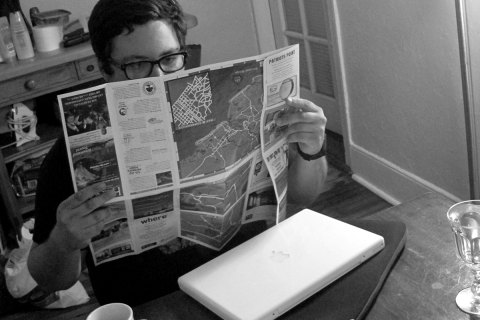
Complex Lives: Interviews with Transmen in the Southeastern United States
by Miriam Abelson, Department of Sociology
When I told people of my proposed research project with transgender people in the Southeast I met with disbelief from many quarters. That disbelief stemmed from the idea that there were few, if any, transgender people in the Southeast and that those that lived there must live in such constant fear that they would never expose themselves by consenting to an interview.
When I told people of my proposed research project with transgender people in the Southeast I met with disbelief from many quarters. That disbelief stemmed from the idea that there were few, if any, transgender people in the Southeast and that those that lived there must live in such constant fear that they would never expose themselves by consenting to an interview.

Pathways and Fences: Gender, Violence, and Mobility in El Paso, Texas and Ciudad Juárez, Chihuahua
by René Kladzyk, Department of Geography
July 16, 2010: I squeeze into a bar in El Paso that sits near the university, a ten-minute drive from the downtown “Paso del Norte” bridge—a thirty-minute walk. It is a Friday night, and all the kids here are from Juárez. It is hot, loud, and packed—barely room to stand, let alone dance or hold a conversation. My friend Inez and I shout at one another—she too is from Juárez, and seems to know everyone. It’s a big city, but this is a small enough scene, I presume.
July 16, 2010: I squeeze into a bar in El Paso that sits near the university, a ten-minute drive from the downtown “Paso del Norte” bridge—a thirty-minute walk. It is a Friday night, and all the kids here are from Juárez. It is hot, loud, and packed—barely room to stand, let alone dance or hold a conversation. My friend Inez and I shout at one another—she too is from Juárez, and seems to know everyone. It’s a big city, but this is a small enough scene, I presume.
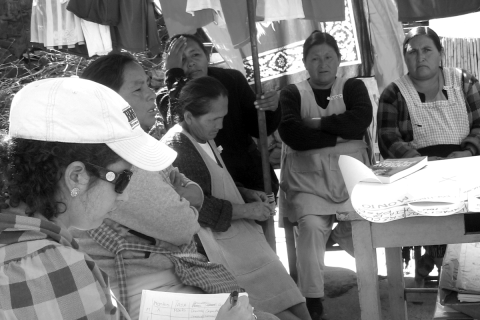
Bolivian Entrepreneurs, Water Rights, and Roller Derby
Gender Roles in Rural Entrepreneurship: A Bolivian Experience
Presenter: Alejandra Garcia, master’s student, UO Department of Planning, Public Policy and Management; M.A. Gender and Women Studies, Armstrong Atlantic State University.
The focus of my research is to bring to light the efforts and struggles of indigenous Bolivian women in rural areas. I provide testimony of some of the inequalities along gender lines in Bolivia. In particular, I focus on women’s struggle to become more independent by being entrepreneurs while still being able to be good wives and mothers.
Presenter: Alejandra Garcia, master’s student, UO Department of Planning, Public Policy and Management; M.A. Gender and Women Studies, Armstrong Atlantic State University.
The focus of my research is to bring to light the efforts and struggles of indigenous Bolivian women in rural areas. I provide testimony of some of the inequalities along gender lines in Bolivia. In particular, I focus on women’s struggle to become more independent by being entrepreneurs while still being able to be good wives and mothers.
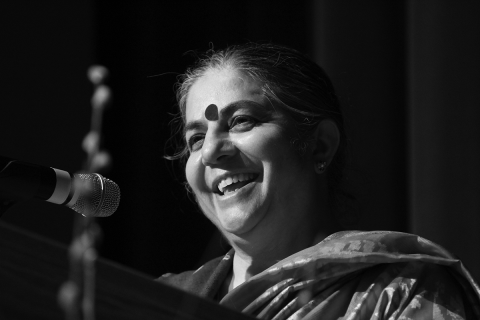
Feminism and Ecology: The Gendered Politics of Food According to Vandana Shiva
by Margaret Hallock, Director, Wayne Morse Center for Law and Politics
Dr. Vandana Shiva, internationally respected author and activist, visited the UO as occupant of the Wayne Morse Chair of Law and Politics during winter quarter 2011. She headlined a major conference on Food Justice: Community, Equity and Sustainability sponsored by the Wayne Morse Center for Law and Politics and cosponsored by CSWS.
Dr. Vandana Shiva, internationally respected author and activist, visited the UO as occupant of the Wayne Morse Chair of Law and Politics during winter quarter 2011. She headlined a major conference on Food Justice: Community, Equity and Sustainability sponsored by the Wayne Morse Center for Law and Politics and cosponsored by CSWS.


